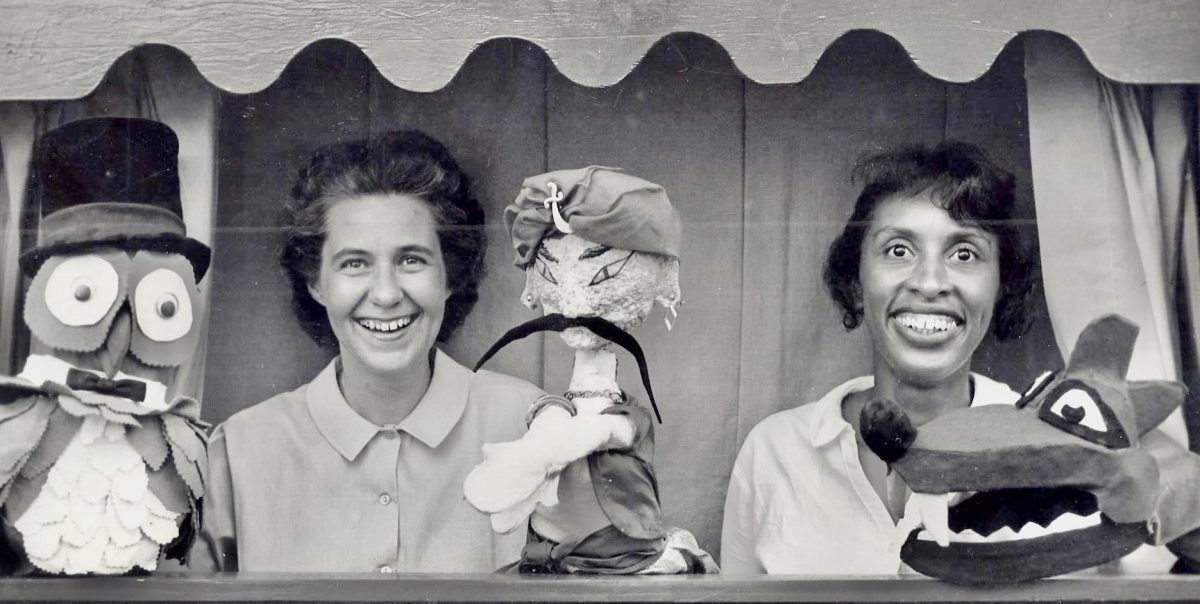
The Ballard Institute and Museum of Puppetry is excited to host a “Wonderland Puppet Theater Symposium” on Friday and Saturday, October 25-26, in conjunction with our Wonderland Puppet Theater: Visions of the Beloved Community exhibition curated by Dr. Paulette Richards.
The “Wonderland Puppet Theater Symposium” is inspired by and explores in more details the work of Alice Swann and Nancy Schmale, housewives from the interracial Concord Park subdivision near Philadelphia, who, inspired by Dr. Martin Luther King, Jr.’s vision of a more equitable “beloved community,” worked together to create a popular hand-puppet theater. Founded in 1961, their company, reflecting contemporary developments in the Civil Rights Movement, the Women’s Movement, and innovations in children’s media, created entertaining and educational puppet productions performed throughout the Northeast. The symposium will bring together University of Connecticut faculty from the departments of Economics, History, English, American Studies, and Women’s, Gender, and Sexuality Studies, with scholars, puppeteers, and activists from the U.S. and abroad.
The symposium is free and open to the public, but registration is required. To register to attend in person, visit: bimp.ticketleap.com.
The symposium will be live streamed via Zoom. To register to attend virtually, please visit: us06web.zoom.us/webinar/register/WN_rQdSZJe8TOmmETxtwng3Xw.
The “Wonderland Puppet Theater Symposium” is supported by a UConn School of Fine Arts Anti-Racism Grant and University of Connecticut Humanities Institute Speaker, Conference, and Workshop funding; and is co-sponsored by UConn’s African American Cultural Center, Women’s Gender, and Sexuality Studies program, and the Robert T. Leo, Jr. Fund for Excellence in the Dramatic Arts.
The schedule will include:
Friday, October 25
4-5 p.m.: Wonderland Puppet Theater exhibition tour with curator Dr. Paulette Richards
5-6:30 p.m.: Dinner break (not provided)
6:30-7 p.m.: Keynote Address: Dr. Paulette Richards
7-8 p.m.: Film Screening: In Black, a documentary on African American puppeteers directed by Jacqueline Wade, with post-screening discussion with the director.
Saturday, October 26
9:30-11 a.m.: “’The Marriage Agreement’: Women Artists Navigate Gendered Divisions of Labor” with Dr. Nancy Naples (UConn Departments of Sociology and Women’s, Gender, and Sexuality Studies), Dr. Alissa Mello (University of Exeter), and Jacqueline Wade (filmmaker and puppeteer).
Early press for Wonderland Puppet Theater identified the artists as Mrs. James Swann and Mrs. Raymond Schmale. Yet 1963, the year they attended the Puppeteers of America national festival was also the year that Betty Friedan published The Feminine Mystique. Wonderland Puppet Theater addressed the discontent around the “traditional” role of women, especially in their portrayals of traditional puppets Punch and Judy. How much progress have women made in re-negotiating “the marriage agreement” and extricating themselves from “the second shift” of housework and childcare that women carried as they moved into occupations, including artistic careers, that took them out of the home?
11:15 a.m. – 12:45 p.m.: “Children’s Media: Literature, Television, Theater” with Dr. Vibiana Bowman (Rutgers University emerita), Dr. Katharine Capshaw (UConn Department of English), and Khalilah Brooks (Puppeteer, Aunty B’s House).
In 1966 Alice Swann and Nancy Schmale began to perform their puppetry on live television. Each week alternated between the two women puppeteering on a show hosted by Willadine Bain, a former high school English teacher. Swann, a certified kindergarten teacher, collaborated with Bain on scripts that presented age-appropriate literacy lessons and information about African American history. How much power do women and people of color have in creating children’s media today? Is children’s media bringing us closer to or taking is further from embracing the vision of “Beloved Community” as a core value?
12:45-2 p.m.: Lunch break (not provided)
2-3:30 p.m.: “Residential Segregation” with Dr. Stephen L. Ross (UConn Department of Economics), and Dr. Jeffrey Ogbar (UConn Departments of History and American Studies).
Morris Milgram was the son of impoverished immigrants in New York City. Expelled from college for leading an anti-fascist protest, he joined the real estate development industry and was a pioneer in desegregated living communities. In 1954 he established Concord Park, an interracial subdivision of single-family homes for middle-class buyers just outside of Philadelphia. This symposium aims to answer the following questions: What is the status of residential desegregation today vs. 1956 when Milgram broke ground on Concord Park? What do developers, lenders, elected officials, and community organizers need to do to make further progress towards realizing Milgram’s dream?
3:30-4: Final Thoughts, moderated by Dr. Paulette Richards, with all symposium participants.